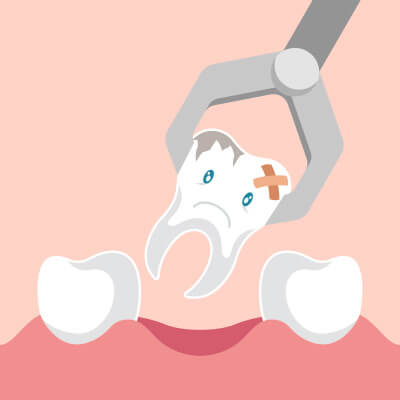Extractions
 You want to keep your natural teeth for as long as you can. With the proper care and attention, you may never have to face the loss of a tooth. At Campsie Family Dental, our team provides comprehensive solutions to keep your smile healthy for life. In certain situations, however, it may be necessary to explore having a tooth extracted.
You want to keep your natural teeth for as long as you can. With the proper care and attention, you may never have to face the loss of a tooth. At Campsie Family Dental, our team provides comprehensive solutions to keep your smile healthy for life. In certain situations, however, it may be necessary to explore having a tooth extracted.
We view a tooth extraction as a last resort. We’ll attempt any other viable method to save your teeth before recommending that you have it removed. If there are other treatment options, we’ll detail them to you so that you can decide how you would like to move forward.
When an Extraction Is Necessary
There are some cases in which an extraction is appropriate. For example, if your tooth is broken to the point where it can’t be repaired. Or if you’ve had severe decay set in and a filling or crown isn’t appropriate. In such a situation, we may recommend that you have a tooth extraction.
What to Expect During an Extraction
It’s important that you know your comfort is always under our consideration. No matter which procedure you have with us, we want you to complete it with ease. It’s no different when you have your tooth extracted. We’ll use a numbing agent to make sure that you are ready to proceed before we start the process. Afterwards, you’ll be given all the guidelines and instructions you need to ensure a quick recovery.
Post-Extraction Tooth Replacement
Nothing is as good as having your own natural teeth remain healthy. If you’ve had a tooth extracted, however, you’ll want to consider replacing it. If you leave a gap in your mouth, it can cause the rest of your teeth to shift out of place.
We’ll be happy to talk about your tooth replacement options, such as a dental bridge or dental implant, after your extractions Campsie are completed. Your dentist will detail the advantages of each choice, then let you decide how you would like to proceed without any pressure from us.
Frequently Asked Questions
What can I eat or drink after a tooth extraction?
You don’t have to restrict yourself to a liquid diet. You can eat various soft foods that don’t require much chewing. For example, pudding, yoghurt, mashed potatoes and applesauce are good choices. Avoid eating hard foods such as nuts or meat for a few days following your extraction.
For the majority of patients, over-the-counter painkillers such as acetaminophen or ibuprofen are sufficient. We recommend that you take a painkiller immediately after your extraction, while you’re still numb. By doing so, you’ll be comfortable as the local anaesthetic wears off. You should avoid taking aspirin, as this can thin the blood and prevent it from clotting.
Though you will likely experience some discomfort after the extraction, it will only impact your daily life for a few days following treatment. After the first week of healing, you should notice improvement. If you experience pain after the first week, contact us straightaway as you may be experiencing dry socket.
Contact Us Today
Let’s work together to improve your oral health. Contact us today to schedule your first appointment! Health funds are accepted at our clinic. If you do not have dental cover, we will be happy to make other payment arrangements for you.
CONTACT US
* Any surgical or invasive procedure carries risks. Before proceeding, you should seek a second opinion from an appropriately qualified health practitioner.
